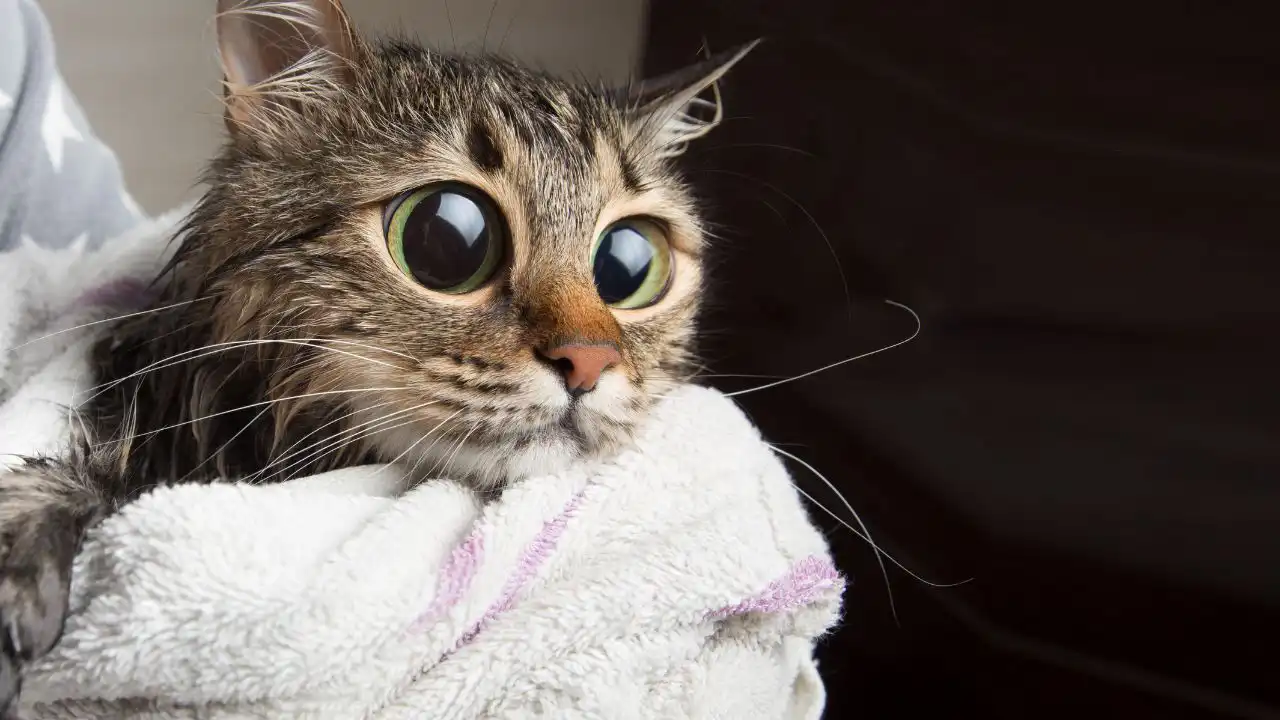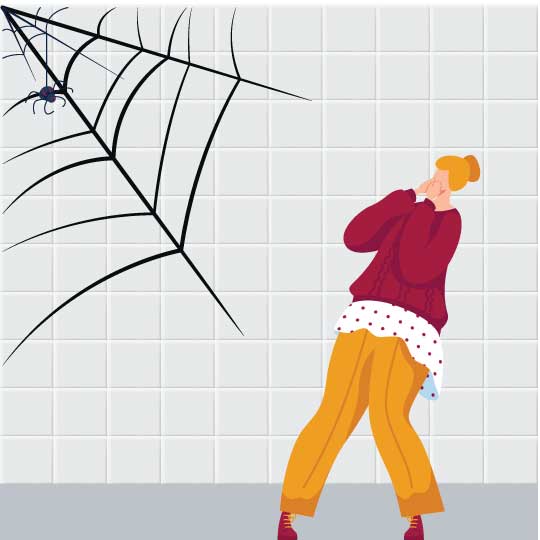
GRE Newsletter Subscribe
Enter your email address below and subscribe to our newsletter

Enter your email address below and subscribe to our newsletter

Hello folks! Welcome back.
In this series of blog posts, we explore the world of words, and help GRE aspirants improve their vocabulary while getting some GRE Verbal Practice in, and ace the GRE Verbal section.
Haven’t read our other blogs yet? Check it out below!
#1 – It’s all Greek and Latin!
#2 – Welcome to the Blob!
#3 – Must-Know GRE Words Set 1
#4 – GRE-Ology
#5 – Reading Apprehension
In this week’s blog, we take a quick peek at a few things that frighten people, the world over. So, if you’re not hippopotomonstrosesquippedaliophobic (afraid of long words), read on to get that GRE Verbal Practice in!
This week’s words are Agoraphobic, Claustrophobia, Arachnophobia, Hydrophobia, and Coulrophobia.
Fear is a natural phenomenon that has existed in humankind since day one. Usually in response to external stimuli, it’s an evolutionary advantage that has let us survive millennia, fighting or fleeing from every threat. These fears are rational, and are driven by an instinct to survive.
The origin of the word ‘phobia’ is from ancient Greek Mythology. Ares, the God of War is depicted as a fearsome personification of blood-lust. Naturally, his children wouldn’t fall far from the tree. Phobos and Deimos, his two sons with Aphrodite, are the personifications of Fear and Terror!
Phobos and Deimos were Ares’ attendants in war, and didn’t/don’t have major roles in Greek Mythology.
(Fun Fact : As per custom, all planets are named after Roman Gods. Mars is the Roman form of Ares. In 1877, astronomer Asaph Hall discovered two satellites of the planet Mars, and named them Phobos and Deimos.)
The concept of fears has been beautifully woven into the stories of Greek and Roman mythology, written by Rick Riordan. The demigod children of gods inherit their fears, and it works great.
Poseidon’s (the god of the sea) children are claustrophobic (afraid of confined spaces), since the sea/ocean is always free and unrestrained.
Athena’s (the goddess of wisdom and strategy) children are arachnophobic (afraid of spiders) because of the rivalry between her and Arachne. Want to know more about this story? Read our previous blog here.
Onto the words!
Part of Speech – adjective
Definition – having an extreme or irrational fear of entering open or crowded places, of leaving one’s own home.
Origin – from Greek agora ‘place of assembly, marketplace’ + -phobia ‘fear’
Usage – In the movie The Woman in the Window, Amy Adams plays an agoraphobic woman.
Agoraphobia is an anxiety disorder that manifests when the affected person perceives their environment to be unsafe. Although most cases occur when out in the open, places like shopping centers or even a crowded form of public transit could trigger an episode. In extreme cases, it renders people unable to ever leave their homes.
Check out The Woman In The Window here.
Part of Speech – noun
Definition – extreme or irrational fear of confined places.
Origin – from Latin claustrum ‘lock, bolt’ + -phobia ‘fear’.
Usage – He has to take the stairs every day because his claustrophobia won’t let him get on an elevator.

A consequence of having claustrophobia means that patients are unable to undergo procedures such as MRI scans due to the amount of time they’ve to spend in the machine, which is pretty compact, even for those without the phobia. There was an interesting study conducted to determine the effects of virtual reality distraction on a specific subcategory of claustrophobic patients during MRI scans.
Two Patients chose from the options of either listening to music only for the duration of a 10-minute mock scan, or to play with a SnowWorld VR experience for the same duration.
The patient who chose the music-only option asked to stop the scan before completion, and was unable to complete it. However, the patient who chose the VR option was able to last the entire duration with low anxiety, and reported feeling an increase in self-efficacy later.
Immersive VR may prove effective at temporarily reducing claustrophobia symptoms during MRI scans, and opens up the possibility to relieve distress and anxiety outside MRI settings as well.

Part of Speech – noun
Definition – extreme or irrational fear of spiders.
Origin – from Greek arakhnē ‘spider’ + -phobia ‘fear’.
Usage – “Don’t come inside if you’ve got arachnophobia. There are several spiders here.”
Part of Speech – noun
Definition – extreme or irrational fear of water, especially as a symptom of rabies in humans.
Origin – from Greek hudro- ‘water’ + -phobia ‘fear’.
Usage – Your hydrophobia is a result of that rabid dog biting you.
Part of Speech – noun
Definition – extreme or irrational fear of clowns.
Origin – from Greek kōlobatheron ‘stilt’ + -phobia ‘fear’.
Usage – Lily refused to take her kids to the circus because she suffers from coulrophobia.
Clowns have always been fondly associated with childhood birthday parties, circuses and are often considered the personification of fun and mischief. A closer look at history would make one doubt that.
Clowns and jesters have been part of all civilizations – Ancient Egypt, Roman to even medieval Europe.
A harlequin, (derived from herlequin or hellequin, meaning an emissary of the devil) is supposed to be mischievous, but its depictions and personalities often had a darker side to them.
The phantom sightings of clowns in several forested areas in America in the last few years did nothing to dispel the coulrophobia people already had.
There have been a few depictions of evil clowns in literature and art such as the Pagliacci operas, but the one that became the archetype was Pennywise, conceptualized by Stephen King. Pennywise is an evil, cosmic entity that takes the form of a dancing clown who offers balloons (they all float!) to unwitting children. It lures them in with a jolly exterior, then devours them.
Interestingly, Pennywise wasn’t received very well when it came out (all 1400 pages of it!), but it’s now become a multi-media success, with it being listed on BBC’s The Big Read poll. There have been several adaptations of the original book over the years.
Having said all this, many critics and researchers claim, that the idea and nature of coulrophobia has been distorted with the advent of these killer/evil clowns. There’s something in that claim that rings true.
Coulrophobia, in essence, is the fear of garden-variety clowns (or circus-variety, in this case), the ones that simply wanted to entertain, and make kids laugh. And the Clowns of America International agree. They dislike the constant negative portrayals of clowns in Hollywood, and the propagation of coulrophobia by sensationalizing something as innocent as people wanting to make others happy. And when clowns are sad…
I’d be doing a disservice if I didn’t end with my favorite piece of clown-related trivia / story. So here goes –
“Heard joke once: Man goes to doctor. He says he’s depressed, says life seems harsh and cruel. Says he feels all alone in a threatening world where what lies ahead is vague and uncertain.
Doctor says, “Treatment is simple. Great clown Pagliacci is in town tonight. Go and see him. That should pick you up.” Man bursts into tears. Says, “But doctor…I am Pagliacci.”
And on that note, hope you enjoyed reading this. See you next week!
Don’t be afraid of GRE Verbal Practice anymore!
Check us out on our Social Media Handles!
Want some more GRE Verbal Practice? Consider checking out our other blogs here.